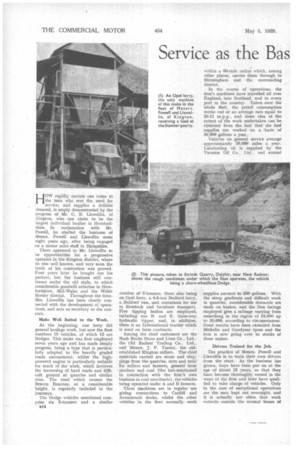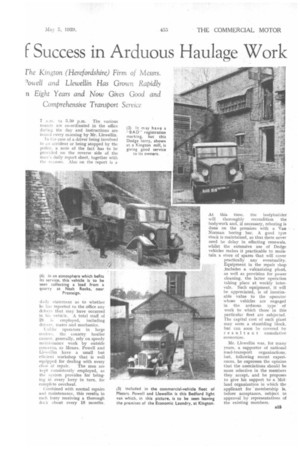Service as the Bas I Success in Arduous Haulage Work
Page 116

Page 117

If you've noticed an error in this article please click here to report it so we can fix it.
The Kington (Herefordshire) Firm of Messrs. 9owell and Llewellin Has Grown Rapidly n Eight Years and Now Gives Good and Comprehensive Transport Service HOW rapidly success can come to the man who sees the need for service, and supplies a definite demand, is amply demonstrated by the progress of Mr. C. B. Llewellin, of Kington, who can claim to be the largest individual haulier in Herefordshire. In conjunction with Mr. Powell, he started the business of Messrs. Powell and Llewellin some eight years ago, after being engaged on a motor sales staff in Shropshire.
There appeared to Mr. Llewellin to be opportunities for a progressive operator in the Kington district, where he was well known, and very soon the truth of his contention was proved. Four years later he bought out his partner, but the business still continues under the old style, to which considerable goodwill attaches in Herefordshire, Mid-Wales and the Welsh Border district. Throughout the time, Mrs. Llewellin has been closely connected with the development of operations, and acts as secretary to the concern, Make Well Suited to the Work.
At the beginning, one lorry did general haulage work, but now the fleet numbers 15 vehicles, of which 12 are Dodges. This make was first employed seven years ago and has made steady progress, being a type that is particularly adapted to the heavily graded roads encountered, whilst the highpowered engine is particularly suitable for much of the work, which involves the traversing of hard roads and difficult grognd at quarries and similar sites. The road which crosses the Brecon Beacons, at a considerable height, is regularly included in the journeys.
The Dodge vehicles mentioned compile six 5-tonners and a similar B14 number of 3:tonners, there also being an Opel lorry, a 4-5-ton Bedford lorry, a Bedford van, and containers for use in livestock and furniture transport. Five tipping bodies are employed, including one B. and E. three-way hydraulic tipper, and, in addition, there is an International tractor which is used on farm contracts, Among the chief customers are the Nash Rocks Stone and Lime Co., Ltd., the Old Radnor Trading Co., Ltd., and Messrs. J. P. Turner, the oldestablished Kington millers. The chief materials carried are stone and chippings from the quarries, darn and meal for millers and farmers, general farm produce and coil (the last-mentioned in connection with the firm's own business as coal merchants), the vehicles being operated under A and B licences.
Three machines are in regular use giving connections to Cardiff and Avonmouth docks, whilst the other vehicles in the fleet normally work
within a. 60-mile radius which, among other places, carries them through to Birmingham and the surrounding district.
In the course of operations, the firm's machines have travelled all over England, into Scotland, and to every port in the country. Taken over the whole fleet, the petrol consumption works out at an average rate equal to 10-11 m.p.g., and some idea of the extent of the work undertaken can be obtained from the fact that the fuel supplies axe worked on a basis of 50,000 gallons a year.
Vehicles on general service average approximately 38,000 miles a year. Lubricating oil is supplied by the Vacuum Oil Co.. Ltd., and annual supplies amount to 350 gallons. With the steep gradients and difficult work in quarries, considerable demands are made on brakes, and the Don facings employed give a mileage varying from something in the region of 18.000 up to 30,000, according to circumstances. Good results have been obtained from Michelin and Goodyear tyres and the firm is now going over to stocks of these makes.
Drivers Trained for the Job.
The practice of Messrs. Powell and Llewellin is to train their own drivers from the start. As the business has grown, boys have been put on at the age of about 15 years, so that they have become thoroughly versed in the ways of the firm and later have qualified to take charge of vehicles. Only in the case of exceptional operations are the men kept out overnight, and it is actually not often that work extends outside the normal hours of
7 a.m. to 5.30 p.m. The various rounds are co-ordinated in the office durieg the day and instructions are issued every morning by Mr. Liewellin.
To ue case of a driver being involved in an accident or being stopped by the police, a note of the fact has to be provided on the reverse side of the maii's daily report sheet, together with the reasons. Also on the report is a da:1■• statement as to whether hekas reported to the office any defects that may have occurred in his vehicle. A total staff of 28 i, employed, including driver. mates and mechanics.
Unlike operators in large centres, the country haulier cannot, generally, rely on speedy maintenance work by outside concerns, so Messrs. Powell and Llee ellin have a small but ellicieut workshop that is well equipped for dealing with every class of repair. The men are kept consistently employed, as the system provides for bringing in every lorry in turn, for complete overhaul.
Combined with normal repairs and maintenance, this results in each lorry receiving a thorough dock about every 18 months.
At this time, the bodybuilder will thoroughly recondition the bodywork and, if neceqsa..ry, x-eboring is done on the premises with a Van Norman boring bar. A good tyre stock is maintained, so that there never need be delay in effecting renewals, whilst the extensive use of Dodge vehicles makes it practicable to maintain a store of spares that will cover practically any eventuality. Equipment in the repair shop ,includes a vulcanizing plant, as well as provision for power cleaning, the latter operation taking place at weekly intervals. Such equipment, it will be appreciated, is of inestimable value to the operator whose vehicles are engaged in the arduous type ' of work to which those in this particular fleet are subjected. The capital cost of such plant may seem a stumbling block, but can soon be covered by resultant cumulative economies.
Mr. Llewellin was, for many years, a supporter of national road-transport organizations, but, following recent experiences, he expresses the opinion that the associations should be more selective in the members they accept, and he proposes to give his support to a Midland organization in which the applicant for 'membership is, before acceptance, subject to approval by representatives of the existing members.
































































































































































